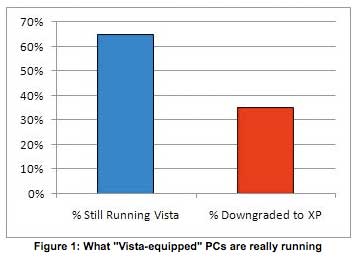 Microsoft says that Vista is fastest-selling version of Windows ever, and that folks who use it really like it. But you also hear stories like the reports that the majority of business PCs sold by HP in Australia go out with XP, no matter what the license states. Then there’s weirdness like Taiwan’s Fair Trade Commission looking into whether Microsoft broke antitrust laws by (mostly) discontinuing Windows XP and thereby denying it to people who don’t want Vista.
Microsoft says that Vista is fastest-selling version of Windows ever, and that folks who use it really like it. But you also hear stories like the reports that the majority of business PCs sold by HP in Australia go out with XP, no matter what the license states. Then there’s weirdness like Taiwan’s Fair Trade Commission looking into whether Microsoft broke antitrust laws by (mostly) discontinuing Windows XP and thereby denying it to people who don’t want Vista.
And in the end, you–at least if you’re me, which I am–are still left wondering: just how popular or unpopular Windows Vista is, anyhow?
Of course, that’s really a series of questions with several possible answers, depending on how you do that math. Windows has multiple constituencies, including consumers who are buying new PCs, consumers who are upgrading existing machines, small businesses who are buying new PCs, small businesses who are upgrading, medium-sized businesses who–well, you get the idea. Every one of those groups has a different set of priorities. You could come up with almost any conclusion you wanted–but I’m still surprised that there’s not more real data out there on the OS’s success to date. It would make for good reading, whether it tended to confirm the general air of disappointment that pervades Vista, or to make it look like things aren’t quite that gloomy.
Anyhow, over at InfoWorld, blogger Randall Kennedy has an interesting post that reveals data from users of 3,000 users of Windows Sentinel, a monitoring utility that lets InfoWorld analyze aggregate data from the PCs of Sentinel users. (In theory, at least, those users should be workers in enterprises rather than home users or microbusiness owners.)
Kennedy reports that the data shows that a third of Sentinel users have downgraded Vista machines to XP, as shown in this chart I swiped from his post:

This striking data point has spawned a bunch of coverage on the Web, some of which sports overblown headlines such as WebMonkey’s “One in Three Advanced PC Users Dump Vista.” Um, this data is about users of Windows Sentinel, and while it may be telling data indeed, it may or may not be reasonable to extrapolate that the percentages apply to “advanced PC users” in general. Kennedy himself makes no broader claims about it, other than the very sensible one that it’s a bit of evidence that when Windows Seven comes along, Microsoft needs to make sure there’s a smooth upgrade path from XP as well as from Vista.
(Side note: Data about Technologizer visitors is fascinating, but clearly not representative of savvy tech users in general. Have I mentioned that five percent of people who have visited this site to date have done so on iPhones? Very cool; probably a sign that you’re an unusually sophisticated bunch; clearly atypical of the world in general.)
Add Kennedy’s factoid to the pretty long list of pieces of information suggesting that the world has yet to embrace Vista in the way Microsoft likely expected it to do fairly quickly. And if you find any stats from a source other than Microsoft that make Vista look better, lemme know…
 Google has long liked to test new features by randomly surprising a subset of its visitors with them to gauge their response. Seems like I’m always reading blog posts from folks who have stumbled upon something unexpected and interesting in one Google service or another, but that I’m never one of the lucky ones. Until this morning, that is.
Google has long liked to test new features by randomly surprising a subset of its visitors with them to gauge their response. Seems like I’m always reading blog posts from folks who have stumbled upon something unexpected and interesting in one Google service or another, but that I’m never one of the lucky ones. Until this morning, that is.
 “Don’t just shop–win!” That’s been eBay’s slogan for quite awhile now. But it looks like it might be appropriate to flop it around into “Don’t just win–shop!”
“Don’t just shop–win!” That’s been eBay’s slogan for quite awhile now. But it looks like it might be appropriate to flop it around into “Don’t just win–shop!” Some of us just sit around tsk-tsking at Apple for its failure to get around to giving iPhones the ability to cut and paste text between applications. Proximi, the company behind the
Some of us just sit around tsk-tsking at Apple for its failure to get around to giving iPhones the ability to cut and paste text between applications. Proximi, the company behind the  Strange but true: These are either the best of times or the worst of times for Apple’s reputation–and it all depends on which developments you choose to pay attention to.
Strange but true: These are either the best of times or the worst of times for Apple’s reputation–and it all depends on which developments you choose to pay attention to. It’s been months since I’ve seen a good story about the battery inside a gadget spontaneously bursting into flames. So today’s news of Nanos overheating (again!) manages to make the top of the T-List.
It’s been months since I’ve seen a good story about the battery inside a gadget spontaneously bursting into flames. So today’s news of Nanos overheating (again!) manages to make the top of the T-List. I’ve long been a fan of
I’ve long been a fan of  Microsoft says that Vista is
Microsoft says that Vista is 
 So help me, I’m addicted to comparing the prices of Macs and Windows PCs. That’s okay, though–judging from site traffic, a startling quantity of Technologizer readers seem to be addicted to reading and discussing my comparisons. On Thursday, I
So help me, I’m addicted to comparing the prices of Macs and Windows PCs. That’s okay, though–judging from site traffic, a startling quantity of Technologizer readers seem to be addicted to reading and discussing my comparisons. On Thursday, I